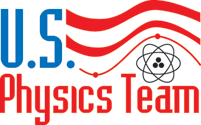
Did you know?
In 1986, under the direction of the AAPT Executive Officer, Jack Wilson, the American Association of Physics Teachers (AAPT) organized the United States Physics Team for the first time. — AAPT.ORG
2019 U.S. Physics Team
Each year, AAPT and the American Institute of Physics (AIP) sponsor a competition for high school students to represent the United States at the International Physics Olympiad Competition. The mission of the U.S. Physics Team Program is to promote and demonstrate academic excellence through preparation for and participation in the International Physics Olympiad. Photos of the 2018 Team and camp are available on Flickr.
Important Dates
December 4, 2018 - F=ma Registration Deadline
January 23 and January 25, 2019 - F=ma Testing Dates (PLEASE NOTE THAT THERE ARE TWO TESTING DATES ONLY)
USAPhO Testing Date, April 2, 2019 (One day only, completed exams will need to be scanned and emailed to AAPT)
May 28 - June 8, 2019 - U.S. Physics Team Training Camp, University of Maryland
July 7-15, 2019 - International Physics Olympiad, Tel Aviv, Israel
News
6/12/2019
U.S. Physics Team Travelers selected for the 2019 International Physics Olympiad. Read the AAPT Press Release.
5/30/2019
Meet the 2019 U.S. Physics Team Members, and the 2019 U.S. Physics Team Coaches. Press Release for the U.S. Physics Team can be found at this LINK!
5/7/2019
A listing of students who qualified for the USAPhO exam can be found by clicking Here! A certificate for the exam will be emailed to the teachers/proctors.
U.S. Physics Team Members and bios will be posted soon.
5/6/2019
2019 U.S. Physics Olympiad Medal Ranking List. Listing of Qualifiers will be posted soon. Certificates will be emailed to the teachers/proctors for the USAPhO exam.
4/30/2019
2019 USAPhO Exam & 2019 USAPhO Exam Solutions. We will post the list of Qualifiers and Medal Ranking list, hopefully by May 6th.
3/18/2019
Please Note: We have sent an email to the teachers/proctors of the students who have qualified to move on to the USAPhO exam. Teachers were provided a link to a student survey that students will need to complete by March 26th in order to take the USAPhO exam. Students should check with their teachers if they have not received this information.
2/20/2019
Due to a typo in the solution for problem 18 of the F=ma January 25th exam B, a corrected version of the solutions are posted at this LINK.
2/19/2019
Solutions for F=ma January 23rd exam A have been updated. Updated solutions are available at this LINK.
2/15/2019
The F=ma exam results are available at this LINK!
Solutions for the F=ma exams are also available, January 23rd exam UPDATED solutions are at this LINK, January 25th UPDATED exam solutions are at this LINK.
Student scores are still being compiled, they should be available by the last week of February, and will be emailed to the exam proctors. Student scores will not be given out over the phone at the AAPT office, students and parents will need to contact their teachers/proctors to find out their scores.
Teachers/proctors will be receiving an email by the last week of February, with a password protected link to check student scores.
The teachers/proctors who have student(s) that qualified to take the USAPhO exam will be receiving an email informing them which of their student(s) have qualified. Please note that the date for the USAPhO exam is April 2, 2019.
A formal listing of students qualifying for the USAPhO exam, and the Medal Ranking for the USAPhO exam will not be posted online until after the USAPhO exam is completed.
2/7/2019
AAPT would like to welcome JiaJia Dong, Associate Professor of Physics & Astronomy at Bucknell University, as Academic Director of the United States Physics Team Program. Read the AAPT Press Release.
2/7/2019
Notice: We understand that the recent weather conditions may have caused an unexpected delay in mailing out your students’ scantrons. Please inform us if you encountered such a delay, and when you were able to mail your scantron packet.
Contact Information
For more details and information about the U.S. Physics Team, please contact AAPT's Programs department at 301-209-3340 or programs@aapt.org

